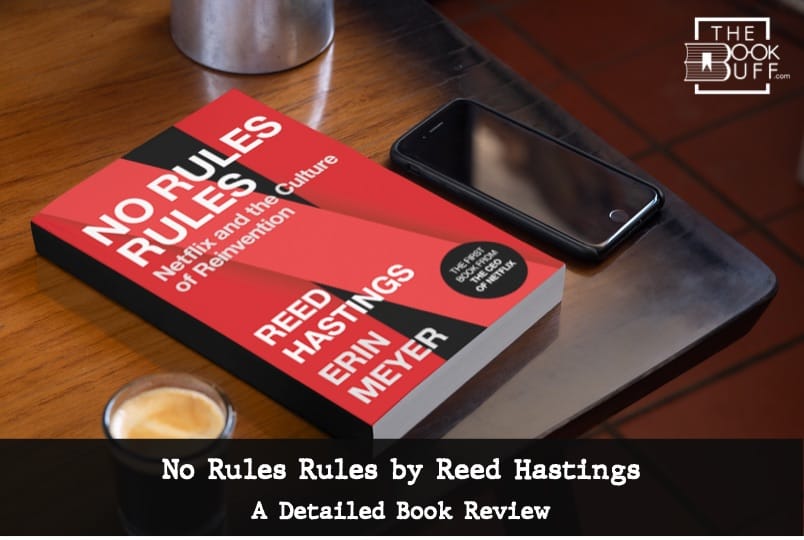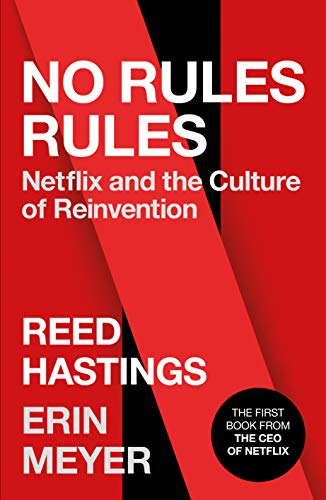No Rules Rules by Reed Hastings and Erin Meyer | The BookBuff Review
Disclosure: This post may contain affiliate links. – meaning I may get a commission if you decide to purchase through my links, at no additional cost to you.

I enjoy biographies a lot! There is so much to learn from. In recent years, I have seen quite a few business heads talking quite openly about their success and failures. Hence, when I heard that the Netflix CEO had a story to share I jumped at it!
Let’s just dive right in.

No Rules Rules: Netflix and the Culture of Reinvention
Author: Reed Hastings, Erin Meyer
Publish date: September 8, 2020
Publisher: Random House UK, Ebury Publishing (Imprint: Virgin Books)
Category: Biographies & Memoirs | Business & Investing | Nonfiction (Adult)
Book Review

Rating: 4/5
Verdict:
Reed’s book is a gift! Let me put this in upper case – EVERY SINGLE CEO (& CHRO) MUST READ THIS!
It is a management styled non-fiction book – yet very binge-worthy!
It is a study of how work-culture is built on freedom & responsibility. It is about how to lead with context, not control.
The principles that Reed Hastings is sharing are both simple and intuitive. Yet, at times you’ll be smiling to yourself saying, of course, that works OR no way, no way!!
No spoilers – but you’ll be intrigued to see how these non-policies have come together to define the Netflix work culture.
In my opinion, most companies are trying to move towards this culture of empowerment. Yet we haven’t adjusted perspectives for a long, long time. In fact with the largely work-from-home environment, this book becomes even more relevant than before. I would encourage CXOs to read and honestly deliberate on some of these non-policies if they truly aim to think, talk and act brilliance.
It is a fabulous read, indeed!
Plotline:
Netflix’s culture is weird! I loved this opening chapter title by Erin Meyer. It, however, sets the context of the book. In 2009, Netflix CEO Reed Hastings had made a Netflix culture document public. Some of the recommendations – like no vacation policy, no expense policy etc – seemed outrageous, at the very least. Yet millions devoured it.
This book comes together to showcase how all of the perceived ‘craziness’ actually has resulted in a successful and nimble company – Netflix.
The book implores us to reexamine some of the practices developed during the industrial revolution. Do we still need a system based on rules and processes? If yes, where does it still apply and when do we pivot? This is a management book that pushes the envelope. It definitely will lead to some very interesting debates about the applicability of the standard corporate culture.
Each chapter goes in-depth into some of the mantras adopted such as:
Lead with context, not control
Say what you really think (feedback)
Do not aim to please the boss
Whisper wins and shout mistakes
Many aspects will seem intuitive and simple, and sometimes absolute madness.
The intuitive example is linked to the familiar adage – Pay peanuts, get monkeys. Yet companies still find it incredibly difficult to pay top dollar for the best talent. Netflix went with the rock star approach – hiring one great person instead of many averages. Hence, pay gold, get rock stars! As awesome as it sounds the flipside is: you do not have traditional job security. If you’re good but not stunning, you’ll be let go. The adequate performance will not cut it.
Another familiar aspect espoused by most businesses is: we’re family! Yet, almost shockingly, Reed says we’re NOT a family at work, but a high calibre sports team. Business leaders should stop saying they’re families. Why? Families stick together and don’t really bother about perfection or performance. If you’re family, you’re less likely to let people go. However for business to be agile you need speed and flexibility – not the usual working around the problem child.
At Netflix, they’re clear: a job isn’t a lifetime arrangement. You’re supposed to hold a spot as long as you’re the best for it. Once you’re not learning or contributing at the highest level you’re to move out. Their company is a world-class sports team, not a family. You’ll be swapped out. Expect it.
It may all seem overly harsh, but the book is perfect for the new age and creative business models. It pushes the envelope – and perhaps it’s time!
Overall, the book is a step-by-step guide of how to deconstruct the typical industrial era style culture and adapt to the new, dynamic world.
My Opinion:
It turned out that this is less biographical but more a business management book. Netflix CEO – Reed Hastings, and INSEAD Professor – Erin Meyer share some important business lessons.
I was fascinated by some of the key opening messages and the feedback culture maps findings. As an Asian, I come from an indirect culture. So yes we use emojis to soften the blows 🙂 (a reference, you’ll get once you read the book)
I also completely identified with the rockstar approach. A rockstar has the ability to adjust and change track when faced with a specific hurdle. She can spot the pattern and make adjustments.
One part that has me on the fence is the – we are a team, not a family aspect. As a communication professional, we often motivate our workforce by seeing themselves as part of the “family”. As a family member, you are always looking out for the best interests of your family. Usually, even go a few extra miles! Yet Reed dislikes this idea. Once you’re thinking of family, then probably you’re also complacent. So are we stoking incompetence? I’m a bit torn on this. I do not completely agree with his assessment.
I do hope though the ‘Informed Captain’ approach of letting the best person for the job, actually do their job becomes more ubiquitous!
Overall, I think it’s a great book to debate the existing paradigm.
How To Buy The Book:
Yes, it’s out everywhere where books are sold. Including online.
You can order your copy here (Amazon link)
10 lines I love from the book – No Rules Rule: Netflix and the Culture of Reinvention:
- Lead with context, not control
- Only say about someone what you will to their face
- the value of creative work should not be measured by time… (that’s) a relic of the industrial age…. Today, in the information age, what matters is what you achieve, now how many hours you clock.
- The greatest software engineer is incredibly creative and can see conceptual patterns that others can’t. She has an adjustable perspective, so when she gets stuck in a specific way of thinking she has ways to push, pull, or prod herself to look beyond.
- The best publicity expert can dream up a stunt that attracts millions of more customers than an average one.
- There is no better way to build trust quickly than to shine a light quickly on a would-be secret.
- Candour is like going to the dentist: a lot of people will avoid it if they can
- To encourage original thinking don’t tell your employees what to do and make them checkboxes. Give them the space to dream big…
- If you are working all the time, you don’t have the perspective to see your problem with fresh eyes.
- Freedom is not the opposite of accountability…instead, it is a path towards it
- At most companies, negotiating a salary is like buying a used car. You want the job, but you don’t know the maximum the company is willing to compensate
- To retain your too employees, it’s always better to give them the raise before they get the offers
Questions for the Book Club
IMP: SPOILER ALERT, visit this section only after you’ve read the book:
- Which is worse: no company values or a mismatch of company values and action? Can you think of examples and elaborate when this has happened? (Eg. Enron, Lehman Brothers)
- Individuals don’t jot down their value system for themselves. Even when they become proprietors or small business owners rarely do they write a value set down. So why do you think almost every single management style asks us to create a company values document and communicate it?
- Despite the clear benefits of candid feedback, we yet see it as confrontation. To avoid conflict situations people instead often advise to go with the flow. How do you feel about this now that you’ve read about the Netflix culture of Honest Always?
- Why do companies – even when led by brilliant executives – shy away from hiring “rockstars”? Do you think we need more discussion on this topic?
- Netflix found that paying variable bonuses as part of salaries wouldn’t be the right thing to do. Do you agree that bonus linked payouts are archaic? Do or would they motivate you more to contribute?
- “Today, in the information age, what matters is what you achieve, now how many hours you clock“. Do you see this becoming more real with work-from-home routines?
- “At most companies, negotiating a salary is like buying a used car. You want the job, but you don’t know the maximum the company is willing to compensate” . Do you agree? Have you had a similar experience?
- Have you experienced the pratfall effect i.e. the tendency for someone’s appeal to increase or decrease after a mistake?
- Can you discuss when culture changed the way your message was received?
Disclaimer: Thanks to #NetGalley for giving me #NoRulesRule for an honest book review.

About the Author
Akansha is a former business journalist and a seasoned communications professional. She is the founder of TheBookBuff, an avid storyteller, and a lifelong biblophile! Check out her profile page to know more about Akansha.

![Why Does Reading Make You Sleepy? [With TIPS to Avoid it!]](https://thebookbuff.com/wp-content/uploads/2021/09/pexels-george-milton-7034619-optimized-300x200.webp)
![Can Kindle Battery be Replaced? – Here’s How! [Full Guide]](https://thebookbuff.com/wp-content/uploads/2022/04/pexels-dan-cristian-pădureț-1476321-300x200.webp)

![Should You Read a Book Prologue? [Here’s What to Do!]](https://thebookbuff.com/wp-content/uploads/2021/10/Book-Prologue-optimized-300x200.webp)

